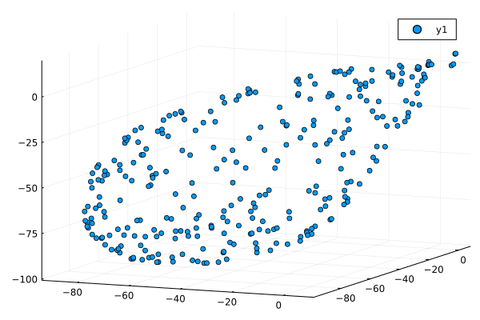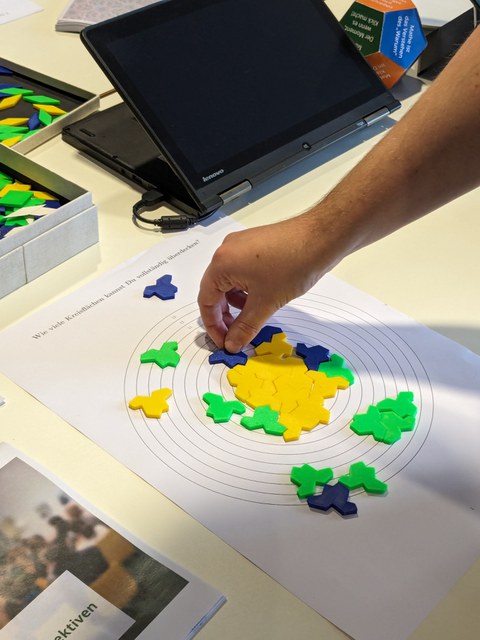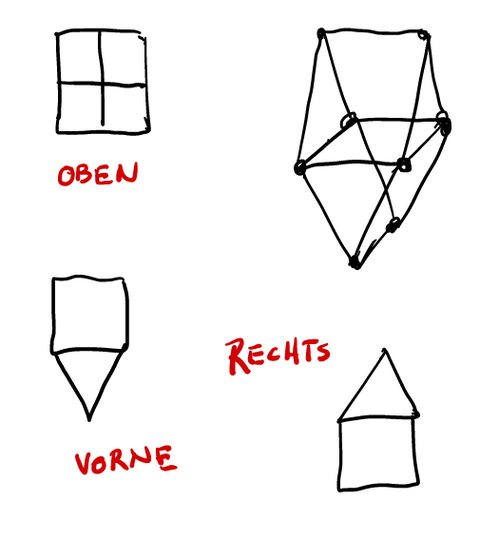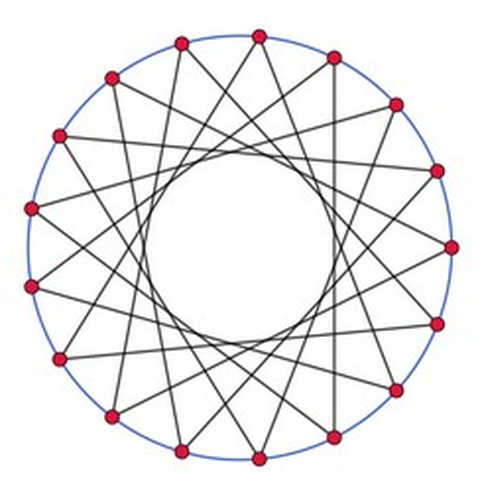Schüler:innenpraktikum – Betriebspraktikum
Das Angebot richtet sich an Schülerinnen und Schüler, die eine Allgemeine Hochschulreife (Abitur) anstreben.
Du interessierst dich für abstrakte Strukturen, Symmetrien und Knobeleien?
Dich faszinieren Zusammenhänge in Natur und Technik und du möchtest wissen, wie man diese mit mathematischen Modellen beschreibt und mit dem Computer simuliert?
„Was hat Mathematik mit Musik und Kunst zu tun?“
Du möchtest wissen, was die Welt im Innersten zusammenhält?
Du möchtest im Bereich MINT studieren?
Dann wird dir sicherlich ein Schülerpraktikum an der Fakultät Mathematik der TU Dresden viel Freude bereiten. Unsere Professor:innen und Mitarbeiter:innen bieten verschiedene Praktika für Schülerinnen und Schüler an Gymnasien ab der 9. Klasse an, z.B. als Betriebspraktikum zur beruflichen Orientierung.
Inhaltsverzeichnis
- Allgemeine Informationen
- Anmeldung und Bewerbung
- Praktikumsprojekte
- P1 - Projekt „Mathematik, Musik und schwingende Saiten“
- P2 – Projekt „Vektoren und Matrizen“
- P3 – Projekt „Modulorechnung und Kryptographie"
- P4 - Projekt „Simulation des gekickten Rotors – Nichtlineare Systeme in der Physik “
- P5 - Projekt „Kopfüber ins Minimum - Optimieren mit Python“
- P6 - Projekt „Mathematik der Musterbildung“
- P7 - Projekt „3 Tafel Projektionen“
- P8 – Projekt „Entdeckungen mit Fadengrafiken“
- P9 – Projekt „Ausgewählte Themen in einem Fachgebiet“
- Ansprechpartner:innen an der Fakultät Mathematik
Allgemeine Informationen
In unseren Praktika
- lernst du spannende Mathematik im Rahmen eines kleinen Schülerprojektes kennen und erhältst einen Einblick in aktuelle mathematische Forschung,
- kannst du dich über das Mathe-Studium informieren und in Vorlesungen reinschnuppern,
- wirst du Studierende und Lehrende der Fakultät Mathematik kennenlernen.
Themen. Die thematischen Schwerpunkte unserer Praktika sind vielfältig – von „reiner“ Mathematik bis hin zu Mathematik an der Schnittstelle zu Natur, Technik, Kunst und Musik. Ein Verzeichnis der aktuellen Praktika findest du hier.
Dauer. Die Praktika sind für 2 Wochen konzipiert.
Gruppe. Wir führen die Praktika bevorzugt in Gruppen mit bis zu 4 Schüler:innen durch. Wir stellen die Gruppen selbst zusammen, aber du kannst dich auch schon mit deinen Mitschülerinnen und Mitschülern als Gruppe anmelden.
Anmeldung und Bewerbung
Bitte schicke deine Bewerbung via Email an (Empfänger: Dr. Antje Noack, Prof. Stefan Neukamm)
Voraussetzungen
- Neugierde und ein hohes Maß an Motivation
- Interesse am Thema des Projektes
- Fähigkeit zum selbstständigen Arbeiten und der Arbeit im Team
- Gute bis sehr gute schulische Leistungen (d.h., Noteschnitt besser als 2.0), insbesondere im Fach Mathematik
Bewerbungsunterlagen
Deine Bewerbung sollte insbesondere folgende Informationen beinhalten:
- Praktikumszeitraum
- Nenne das von dir präferierte Praktikumsprojekt und 2 Ersatzprojekte. Du kannst auf die Kurzbezeichnungen in der Liste verweisen.
- Motivationsschreiben: Warum möchtest du ein Praktikum bei uns durchführen und warum interessiert dich das Projekt.
- tabellarischer Lebenslauf
- aktuelles Zeugnis
Ablauf der Bewerbung
Die Praktikumsplätze für das Schuljahr 2025/2026 werden ab Oktober 2025 vergeben. Sie werden gestaffelt vergeben, d.h., alle Bewerbungen bis Oktober werden gesammelt und zum 1. November vergeben. Die Vergabe erfolgt dann wieder zum 1. Dezember und 1. Januar. Bei Praktika, die bereits im November stattfinden, melden wir uns vorher. Wir versuchen bei der Zuordnung deine Wunschprojekte zu berücksichtigen. Es kann aber auch passieren, dass wir dir ein ganz anderes Projekt vorschlagen, falls die Wunschprojekte schon voll sind oder gerade nicht angeboten werden können.
Praktikumsprojekte
Unser Angebot an Praktikumsprojekten wird gerade aktualisiert, d.h., einige Projekte werden wegfallen und neue werden neu dazu kommen. Das ist abschließend bis Mitte Oktober zu unserem Semesterbeginn zu erwarten.
Bewerbungen für das Schuljahr 25/26 können jetzt schon gestellt werden. Gib dann vorerst alle Wunschprojekte aus der folgenden Liste an und schreib uns eine ergänzende E-Mail im Oktober, wenn sich etwas ändert.
P1 - Projekt „Mathematik, Musik und schwingende Saiten“
Leitung: Prof. Stefan Neukamm – Professur für Angewandte Analysis
Beschreibung: Wie sehen Töne, Klänge und Geräusche aus und wie hören sich Funktionen an? Was haben die Intervalle der Musik, die trigonometrischen Funktionen und die Physik der schwingenden Saite miteinander zu tun? Wie können wir eine schwingende Saite mathematisch Modellieren und am Computer simulieren? Im Praktikum untersuchen wir in der Gruppe diese und weitere Fragen mit Methoden der Analysis und mit Hilfe von einfachen Simulationen, die wir selber in Python programmieren. Eine Abschlusspräsentation zum Projekt der vergangenen Jahre findest du hier.
Bewerber:innen-Profil: Interesse an Mathematik und Naturwissenschaften. Hilfreich: Du spielst ein Instrument.
Stichworte: Analysis, Mathematische Modellierung, Programmieren mit Python, Intervalle der Musik, Obertonreihe, Stimmungssysteme
Max. Gruppengröße: 4
P2 – Projekt „Vektoren und Matrizen“
Leitung: Dr. Antje Noack – Institut für Algebra
Beschreibung: Kräfte werden durch Vektoren veranschaulicht. Ein Schachbrett kann durch eine einfache Matrix dargestellt werden. Bei vielen weiteren Anwendungen treten Vektoren und Matrizen als Hilfsmittel in der Praxis auf. Dem soll etwas auf den Grund gegangen werden. Du arbeitest dich selbstständig in die Thematik ein und machst dich mit den Eigenschaften dieser Objekte durch verschiedene spannende Aufgabenstellungen bekannt. Mithilfe des Softwarepaketes Matlab (oder Python) sollen kleine Programme geschrieben werden, wie zum Beispiel zur Bewegung von Vielecken in der Ebene.
Bewerber:innen-Profil: Interesse an Mathematik und Naturwissenschaften.
Stichworte: lineare Algebra, Programmierung
Max. Gruppengröße: 4
P3 – Projekt „Modulorechnung und Kryptographie"
Leitung: Dr. Julia Goedecke – Institut für Geometrie
Beschreibung: Kryptographie, also die Verschlüsslung sensibler Daten oder Nachrichten, ist in der heutigen Welt an vielen Stellen unumgänglich: zum Beispiel für sichere Internetkommunikationen (inklusive WhatsApp), den Schutz von Regierungs- oder Industriegeheimnissen oder sensible Kundendaten, und Internetshopping. In diesem Projekt geht es nach einer kleinen Einführung in die historischen Anfänge (z.B. Caesar-Verschlüsslung) um modulare Arithmetik und den RSA-Algorithmus. Das ist ein asymetrisches Verschlüsslungsverfahren, auch public-key-Verfahren genannt. Modulare Arithmetik hat jeder, der die Uhr lesen kann, schon einmal gemacht, und du wirst die mathematischen Grundlagen hierfür kennenlernen. Du arbeitest dich selbstständig in die Thematik ein und kannst durch spannende Aufgabenstellungen verschiedene Aspekte erkunden, und auch ein paar kleine Beweise kennenlernen. Eventuell wirst du auch mit dem Softwarepaket MatLab ein wenig programmieren.
Bewerber:innen-Profil: Interesse an Mathematik und/oder Informatik
Stichworte: Kryptographie und Zahlentheorie
Verfügbarer Zeitraum: ab sofort
Max. Gruppengröße: 4
P4 - Projekt „Simulation des gekickten Rotors – Nichtlineare Systeme in der Physik “
Leitung: Lukas Keller – Institut für Numerische Mathematik
Beschreibung: Der gekickte Rotor ist ein klassisches Beispiel für ein nichtlineares System, das chaotische Bewegungen zeigen kann. Dieses Phänomen wird in der Physik und Mathematik oft als Beispiel für komplexes Verhalten verwendet. In diesem Praktikum werden wir uns mit den grundlegenden physikalischen Prinzipien hinter dem gekickten Rotor auseinandersetzen und diese in Python simulieren. Dabei wollen wir untersuchen, wie weit wir mit einfachen mathematischen Modellen und Simulationen das komplexe Verhalten dieses Systems beschreiben und unter verschiedenen Bedingungen beleuchten können.
Ziele des Praktikums: Mathematische Modellierung des gekickten Rotors; Implementierung und Simulation des Systems mit Python; Visualisierung und Analyse der Ergebnisse
Bewerber:innen-Profil: Interesse an Mathematik, Physik und Programmierung
Stichworte: Nichtlineare Systeme, Simulation, Python, Mechanik
Verfügbarer Zeitraum: ab sofort
Max. Gruppengröße: 3
P5 - Projekt „Kopfüber ins Minimum - Optimieren mit Python“
Leitung: Prof. Alexandra Schwartz, Carolin Leili – Professur für Mathematische Optimierung
Beschreibung: Du hast sicher schon mal einen Cartoon gesehen, in dem jemand einen Abhang hinunterpurzelt und sich dabei immer wieder überschlägt („autsch, autsch…“). Genau diese Idee — zumindest als anschauliches Bild — steckt hinter einem mathematischen Verfahren, mit dem man Minimalstellen von Funktionen finden kann. Das Spannende daran: Dafür brauchst du nur Mathe, die du schon aus der Schule kennst!In unserem Praktikum lernst du die Grundlagen des Programmierens mit Python und entwickelst Schritt für Schritt ein eigenes Programm, das solche Minimierungsaufgaben löst — von einfachen Beispielen bis hin zu einem Verfahren, das sogar Funktionen mit mehreren Veränderlichen in den Griff bekommt.
Bewerber:innen-Profil: Interesse an Mathematik und Programmierung, hilfreich ist ein gutes räumliches Vorstellungsvermögen
Stichworte: Optimierung, Programmieren mit Python, Funktionsbegriff, Punkte in der Ebene
Max. Gruppengröße: 2
P6 - Projekt „Mathematik der Musterbildung“
Leitung: JProf. Markus Schmidtchen – Professur für Angewandte Mathematik
Beschreibung: Bei genauerem Hinschauen entdeckt man Selbstorganisation fast überall in der Natur. Ein sehr anschauliches Beispiel für Selbstorganisation sind Vogelschwärme, die sich bilden obwohl es gar keinen 'Leader' gibt, der dieses Verhalten anordnet. Ein ähnliches Verhalten ist auch in Fischschwärmen, oder Tierherden zu beobachten. Und was hat jetzt Mathematik damit zu tun? In dem Praktikum zur Musterbildung wollen wir gemeinsam untersuchen und mittels mathematischen Formalismen modellieren, wie es in großen Gruppen zu Selbstorganisation und Musterbildung kommen kann. Anschließend werden wir das Verhalten am Computer simulieren.
Bewerber:innen-Profil: Interesse an Mathematik und den Naturwissenschaften
Stichworte: Mathematische Modellierung, Selbstorganisation, Dynamik großer Gruppen
Max. Gruppengröße: 4
P7 - Projekt „3 Tafel Projektionen“
Leitung: Prof. Manuel Bodirsky, Dr. Philipp Grzywaczyk – Professur für Algebra und Diskrete Strukturen
Beschreibung: Im technischen Zeichnen werden 3 Tafel Projektionen (auch Normalprojektion, englisch auch "third angle projection" oder "multiview orthographic projection") zur Darstellung von dreidimensionalen Konstruktionen mit Hilfe von
zweidimensionalen Projektionen (den Tafeln) eingesetzt. Typischerweise wählt man hier Projektionen in drei paarweise orthogonale Richtungen; ein Beispiel hierfür findet sich in der Abbildung rechts.
Hier soll es um die Frage gehen, unter welchen Voraussetzungen man aus gegebenen Tafeln die ursprüngliche Konstruktion zurückgewinnen kann. Weiterhin interessieren wir uns für Kriterien, ob es für gegebene Tafeln überhaupt eine Konstruktion mit den entsprechenden Tafeln gibt. Selbst wenn wir voraussetzen, dass die gesuchte Konstruktion ein Polytop (wie in der Abbildung) ist, ist dennoch kein effizienter Algorithmus bekannt, der zu drei gegebenen Tafel entscheiden kann, ob es eine Konstruktion gibt, die zu den gegebenen Tafel passt; es handelt sich hier also um ein noch offenes Forschungsproblem.
Das Ziel des Projektes ist ein möglichst umfassender Katalog von interessanten Beispielen für Instanzen dieses Problems samt ihrer Lösung.
Jedes Beispiel soll dabei bestehen aus
- den 3 Tafeln, also den 3 Projektionen aus den 3 Perspektiven, sowie
- einem Polytop, welches zu den drei Tafeln passt, beziehungsweise einem Argument, dass es kein solches Polytop geben kann.
Bewerber:innen-Profil: Räumliche Vorstellung. Kenntnisse in linearer Algebra und diskreter Geometrie sind wünschenswert, aber nicht erforderlich.
Max. Gruppengröße: 4
P8 – Projekt „Entdeckungen mit Fadengrafiken“
Leitung: Heino Hellwig, LfbA Didaktik der Mathematik, Institut für Analysis
Beschreibung: Einen sehr reizvollen Zugang zur Schmieggeraden und Hüllkurven (Enveloppe) bieten einfache Fadenbilder. Sie ermöglichen eine experimentelle Untersuchung einer Vielzahl von Kurven. Mit Geogebra oder Python (Turtel-Grafik) können elegante Fadengrafiken erstellt werden. Dabei entstehen Muster, die nach Erklärung und Einsicht in ihre Entstehung verlangen. Vermutungen werden aufgestellt und Beweise geführt. Ein Ausblick auf das Gebiet der Modellierung mit kubischen Bézier-Kurven könnte das Praktikum beenden.
Bewerber:innen-Profil: Interesse an Mathematik und Naturwissenschaften.
Stichworte: Geometrie, Analysis, Programmieren mit Python
Max. Gruppengröße: 4
P9 – Projekt „Ausgewählte Themen in einem Fachgebiet“
Leitung: Fakultät Mathematik
Beschreibung: Du hast dich bereits intensiv mit einem Bereich der Mathematik beschäftigt – vielleicht über eine Facharbeit, Wettbewerbe wie die Mathematik-Olympiade oder einfach aus persönlichem Interesse? In diesem Projekt bieten wir dir die Möglichkeit, dich individuell mit einem fortgeschrittenen Thema der Mathematik zu beschäftigen. Die konkrete Themenwahl stimmen wir gemeinsam mit dir ab – orientiert an deinen Vorkenntnissen, Interessen und Zielen, die Du in Deiner Bewerbung möglichst detailliert beschreibst.
Bewerber:innen-Profil: Du bringst eine überdurchschnittliche Begeisterung für Mathematik mit und hast dich bereits über den Schulstoff hinaus mit mathematischen Fragestellungen beschäftigt.
Stichworte: Vertiefung Mathematik
Max. Gruppengröße: 1
Ansprechpartner:innen an der Fakultät Mathematik
Dr. Antje Noack, Tel.: 463 32149
Prof. Dr. Stefan Neukamm, Tel.: 463 33998
Kontakt:
Eine Gesamtübersicht der Praktikumsplätze der TU Dresden für Schüler:innen findest du hier.




